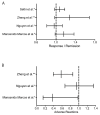Laboratory Tests in Inflammatory Bowel Disease: An Evidence-Based Approach to Daily Practice
- PMID: 40002904
- PMCID: PMC11852734
- DOI: 10.3390/biomedicines13020491
Laboratory Tests in Inflammatory Bowel Disease: An Evidence-Based Approach to Daily Practice
Abstract
Inflammatory bowel diseases (IBDs) comprise a group of chronic gastrointestinal disorders characterized by periods of relapse and remission. The mainstay of treatment is medical, involving medications such as steroids, immune modulators, monoclonal antibodies (categorized as biologics), and small molecules. These medications can provide profound therapeutic benefits, but they can also cause severe and irreversible toxicities. Clinicians may utilize laboratory tests in the diagnosis and management of IBD including assessment of disease activity, monitoring medication response or toxicity, surveillance of infectious complications, and detection of nutritional deficiencies. Routine use of laboratory tests may help clinicians avoid reactivation of life-threatening infections such as tuberculosis or hepatitis B virus upon initiation of immune suppressive therapy. They can also be used to detect vitamin deficiencies such as B12 deficiency, which has the potential to cause irreversible neurologic damage. While some laboratory tests constitute established practices, the utility of newer tests such therapeutic drug monitoring (TDM) in the era of biologics is an evolving topic. Although clinical assessment with imaging, endoscopic, and histopathological examination is standard practice, laboratory tests serve as valuable adjuncts. We aim to explore the broad range of laboratory tests available to clinicians and to summarize their application in the current management of IBD in daily clinical practice, with special attention to updates in therapeutic drug monitoring.
Keywords: Crohn’s disease; anti-drug antibodies; inflammatory bowel disease; therapeutic drug monitoring; trough level; ulcerative colitis.
Conflict of interest statement
The authors declare.no conflict of interest.
Figures



References
Publication types
Grants and funding
LinkOut - more resources
Full Text Sources

